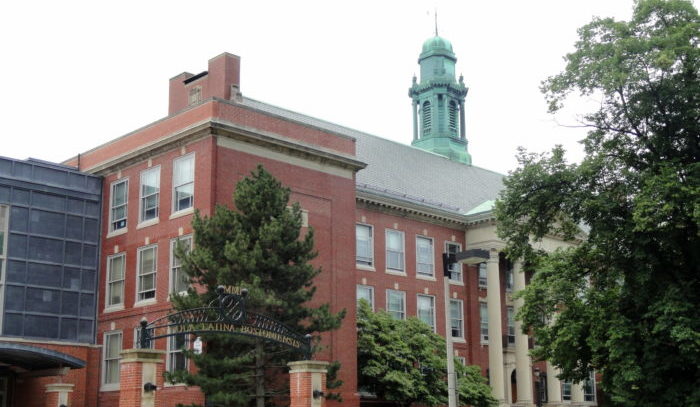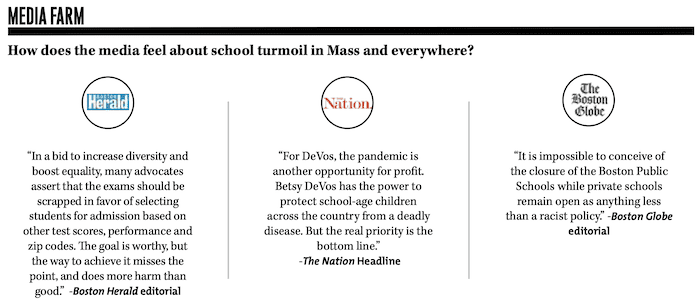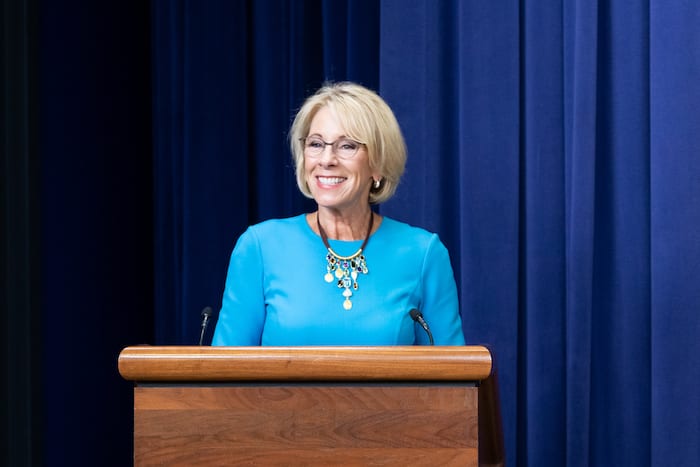
Exam school tests suspended, while ed sec who never passed one keeps failing
LOCAL
Last week, the Boston School Committee voted to temporarily suspend the entrance test to the three exam schools in the district that was originally supposed to replace the racially biased test that was booted in 2019.
In a typical year, sixth and eighth grade students are eligible to take a test to gain entrance in either Boston Latin School, Boston Latin Academy, or the O’Bryant School of Mathematics and Science.
The new standard will combine GPA, 2019 MCAS scores, and zip codes in order to increase equitable access. Students within the top 20th percentile in terms of GPA will be allowed to apply. Students that live in zip codes with lower economic demographics will be favored while weighing GPA and 2019 MCAS scores to fill out the other 80% of the application pool.
Critics of the schools have long argued that they are functionally private schools with demographics that include a higher percentage of white students than the rest of the BPS system. Those complaints came to a head in 2018 after the release of a report from the NAACP Boston and the ACLU of Massachusetts that found significant racial disparity between the exam schools and the rest of the Boston school system.
Back in July, the Boston School Committee created an advisory group to determine how and whether to administer the annual test for the exam schools due to COVID-19. In early October, the group recommended that the test be suspended. This would have been the first year for the new exam after the previous one had been dropped last February due to racial bias.
For at least one year, the students of Boston will have more of an equitable shot at one of the exam schools—if COVID-19 does not get them first.

STATE
Gov. Charlie Baker announced that the Bay State’s schools were not super spreaders during his Oct. 22 press conference in which he announced his $774 million stimulus package.
“The kids in schools are not spreaders of COVID-19,” the governor said. “There’s no better example of this than in parochial schools.”
Despite state recommendations against this, most of the state’s Catholic and other faith-based schools reopened with full in-person learning. While public schools are starting to scale back hybrid learning in order to reduce COVID-19, parochial schools claim that they have seen little to no spread among students.
Baker also urged residents to pay attention to the local COVID-19 data to get a better sense of infection rates in the area. The state’s own data, as of the end of last month, shows that individuals 19 and under have accounted for more new infections than any other age group since mid-October.
Although the same data set shows that children are least likely to need hospitalization and die, there is no direct line drawn between infected children spreading the disease to older relatives. Even though that is clearly the case.
While Boston Mayor Marty Walsh announced that Boston Public Schools would revert to exclusively online learning after cases in the city rose, Baker declined to comment on whether or not he supported the move.
“I’m not going to Monday morning quarterback this stuff,” the governor told reporters.

NATIONAL
US Secretary of Education Betsy DeVos said that she did not think it was her department’s responsibility to track COVID-19 rates in schools across the country.
Those comments were made during a discussion with American Enterprise Institute fellow and chronic anti-public school advocate Ian Rowe. Hosted by the Milken Institute on Oct. 20, the discussion—between a Koch-funded anti-public school flack and an education secretary who has been repeatedly sued for screwing people with student debt—was performed remotely due to COVID-19 concerns that do not extend to the children in public school classrooms.
“I’m not sure there’s a role for the department of education to compile and conduct that research,” said DeVos. “We know that the CDC is continuing to compile all of the data. The data is there for anyone who wants to look for and search for it.”
In the same talk, DeVos said that she had seen some “bright spots” since the pandemic, but every example involved leaving the public school system for home schooling or private learning.
Perhaps in the hopes of creating more “bright spots,” DeVos also recently said that she plans to focus the department’s COVID-19 efforts to allow faith-based schools to obtain charter school status and to base school funding on how many students are brought into the classroom, as opposed to remote learning.
All things considered, it’s no surprise that a recent study by the 74 found that DeVos has been sued at least 455 times over her for-profit education policies—a record by any measure.
In a statement to Newsweek about the trend of DeVos breaking the law and getting called out for it, DOE press secretary Angela Morabito wrote, “The radical left and education establishment have done everything they could think of to try and stop Secretary DeVos’ student-first agenda, which threatens their grip of power. They also haven’t successfully stopped the Department from putting students first, returning power to local educators and families, and shrinking Washington’s control over education in America.”
Yeah, sure.
Zack is a veteran reporter. He writes for DigBoston and VICE, and formerly reported for the Boston Courant and Bulletin Newspapers.

